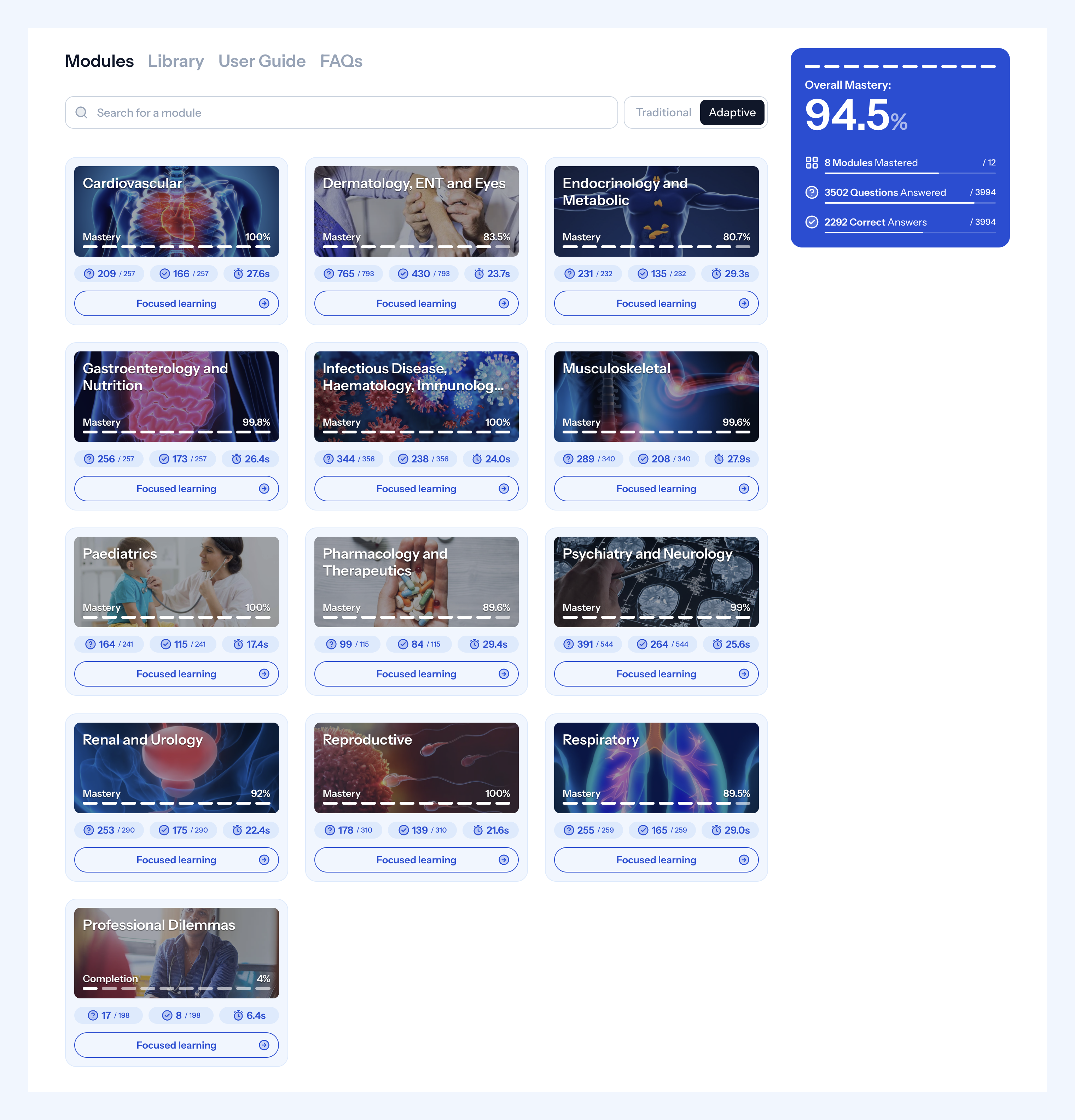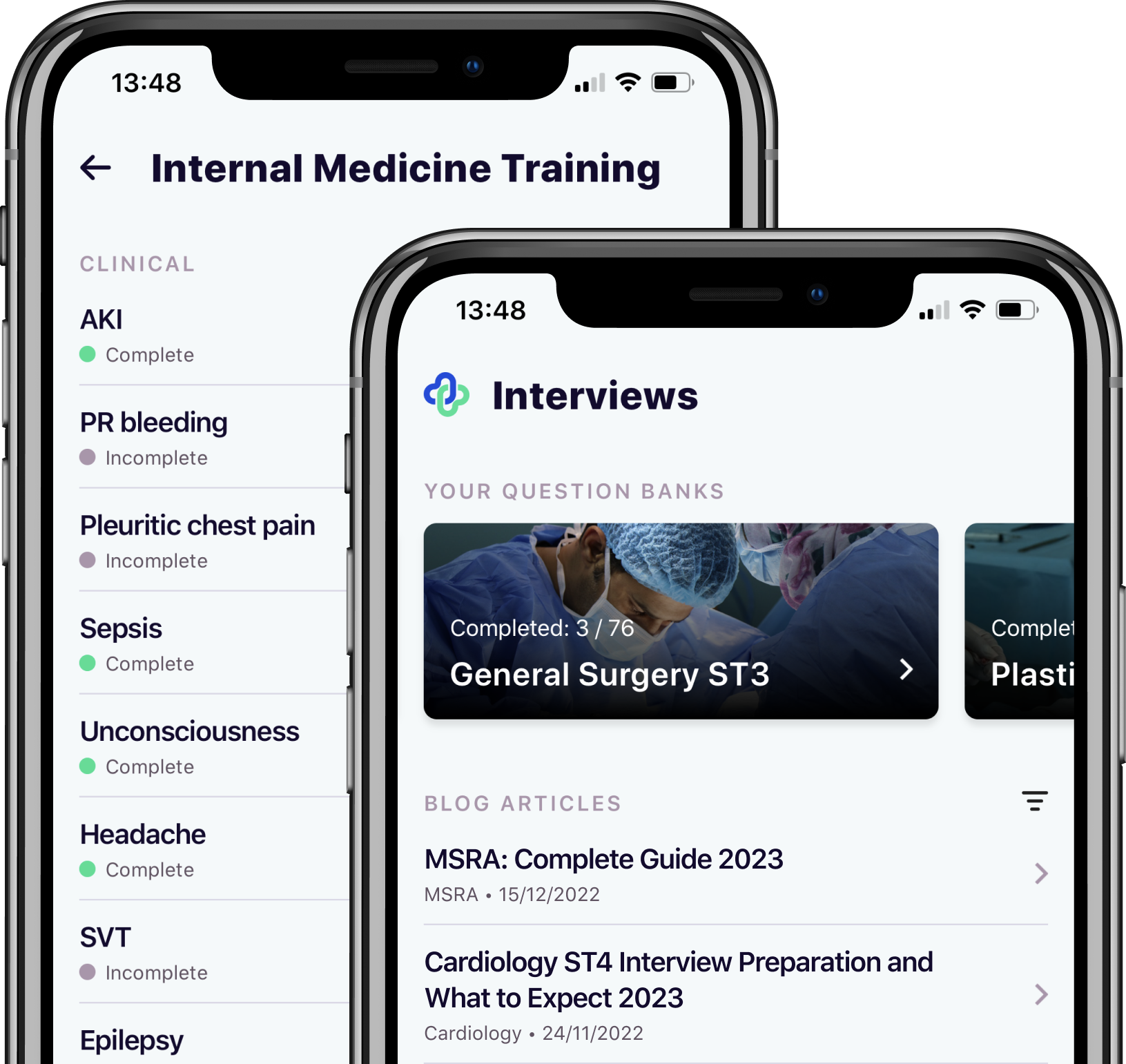
MSRA Exam Revision
If you’re applying for a Specialty Training (ST) post in 2026, you may need to undertake the Multi-Specialty Recruitment Assessment (MSRA) as part of the recruitment process. Our MSRA exam revision guide will provide you with advice and tips on preparing effectively, as well as information about the ‘exam difficulty’ and ‘what is a good score?’.
For some specialties, if you score highly on the MSRA, you can bypass the interview stage of recruitment, meaning there are huge advantages of preparing effectively and performing well in the MSRA. Furthermore, General Practice ST1 and Core Psychiatry CT1 assess and rank applicants based solely on their MSRA performance; therefore, if you’re applying for these, it’s more important than ever to ensure that you’re as prepared as possible for the exam.
For more details relating to the specialties which currently require completion of the MSRA, exam dates and how the MSRA is scored, visit our MSRA: Complete Guide 2026.
Is the MSRA exam difficult?
The MSRA is designed to assess essential competencies expected at foundation level. The Professional Dilemmas paper assesses your professional behaviours and judgements in relation to clinical scenarios; relating directly to the General Medical Council’s (GMC’s) generic professional capabilities framework, it thereby assesses the capabilities expected of all doctors. The Clinical Problem Solving paper assesses your ability to make appropriate clinical decisions drawing on your clinical knowledge and problem solving skills; based on the Foundation Programme, it assesses competencies expected at this stage of your experience. Therefore, the MSRA is an accessible and fair examination for entry to ST.
That being said, the MSRA is competitive, and as discussed previously, outperforming your peers can have significant advantages for your ST recruitment; therefore, the importance of preparing well for the MSRA should not be underestimated. Effective preparation will develop your understanding of the types of questions you’ll be asked and the exam expectations, allowing you to build experience and confidence when answering the questions. The ‘how to revise’ section below will provide guidance and tips on preparing successfully for the MSRA.
What is a good score on the MSRA?
Your MSRA score will be used for the purpose of shortlisting for interview, and in most cases – with the exception of Community Sexual – it will be combined with your interview score for ‘ranking and offering’. Therefore, achieving a ‘good’ score will impact not only your chance of receiving an interview but also your ranking following this. You can find more information about shortlisting, interviews, offers and ranking for each specialty here.
Additionally, specialties such as Obstetrics and Gynaecology ST1 allow you to bypass the interview stage if you achieve a top score in the MSRA. Therefore, achieving a high MSRA score can be extremely beneficial.
However, there is no one ‘good’ score for the MSRA, as how your MSRA score is used and the expectations on your performance will depend on the specialty to which you’re applying to. Often specialties scale MSRA scores, rather than use raw marks, but again this varies between specialties. It’s always best to check the specific national recruitment website for guidance on your specialty of choice.
Can I resit the MSRA?
Your MSRA score is valid for the duration of the recruitment year in which you take the exam. However, if you wish to resit the exam due to an unsuccessful attempt or to improve your score, check the guidance for your chosen specialty for rules and restrictions relating to resits, as these do vary between specialties.
How do I revise for the MSRA?
Familiarising yourself with the exam content is a useful starting point for your MSRA preparations. This will ensure that you’re aware of the demands of the exam and allow you to identify any subject areas which you may need to revisit as part of your MSRA revision. For a breakdown of the MSRA exam structure and different test papers, visit our MSRA complete guide and practice questions blogs.
You may also find it helpful to revisit the following documents, given their influence on the MSRA exam, as mentioned previously:
As well as exploring the exam topics, incorporating practice questions is essential for your MSRA preparations. This allows you to become familiar with the different types of questions and scenarios you’ll encounter during the exam, and provides opportunities to practise applying your knowledge and problem solving skills, which are important elements that will be assessed within the MSRA exam.
Our adaptive MSRA question bank not only provides you with thousands of practice questions! Powered by artificial intelligence, it also automatically identifies your strengths and areas for development, ensuring that you’re given the right questions at the right time. By personalising learning to your individual needs, it enables you to focus on the topics which will have the biggest impact on your MSRA score, making the most effective use of your valuable revision time. The dashboard (below) also provides a clear snapshot of how you’re performing across all topics so you target the areas that you need to improve.

Visit our MSRA question bank to start preparing for the MSRA exam more efficiently and take your exam revision to the next level.
MSRA revision tips
Preparing well for the MSRA will ensure that you give yourself the best possible chance of achieving a high MSRA score and positively impacting your ST application. The following are some final tips to support you in preparing effectively for the MSRA exam:
- Ensure you dedicate enough time
To ensure that you’re confident in all aspects of the exam and can perform well, give yourself adequate time to prepare for both test papers – Professional Dilemmas and Clinical Problem Solving – and make sure you cover all topics in the Clinical Problem Solving paper. To learn more about the topics covered in the MSRA exam, visit our MSRA complete guide or practice questions blogs. - Make the most of your time
Preparing for an exam while working a full-time job is no easy feat, so anything you can do to make your revision time more productive will be beneficial, and no doubt have a positive impact on your MSRA score. Rather than aimlessly completing question after question, use our adaptive MSRA question bank to make the most effective use of practice questions. Also available as an app, you can answer questions and review your feedback on the go, allowing you to squeeze in some MSRA revision whenever you have the opportunity. - Get familiar with the exam functions
Making yourself aware of the exam functions doesn’t sound like the most crucial exam preparation, but knowing what to expect will help you feel more confident and avoid pointlessly wasting time during the exam. Pearson VUE, who delivers the exam, provides a generic tutorial so you can view the controls and screen layout before the test day. - Maximise your chance of picking up points
Although not strictly related to revision, it’s always worth remembering that neither paper in the MSRA exam is negatively marked, so it’s worth attempting to answer all questions as it may just get you an extra few marks on the exam.
Visit the MSRA section of our website for more support on preparing for the MSRA, including our practice questions blog for guidance on the structure of the exam and how to prepare, as well as example MSRA practice questions, and our question bank blog for advice on MSRA question banks, how to pass the exam and how many practice questions will help you to prepare for the MSRA.

Take your subscriptions with you
Our mobile app allows you to access your interview and exam question banks wherever you are.





